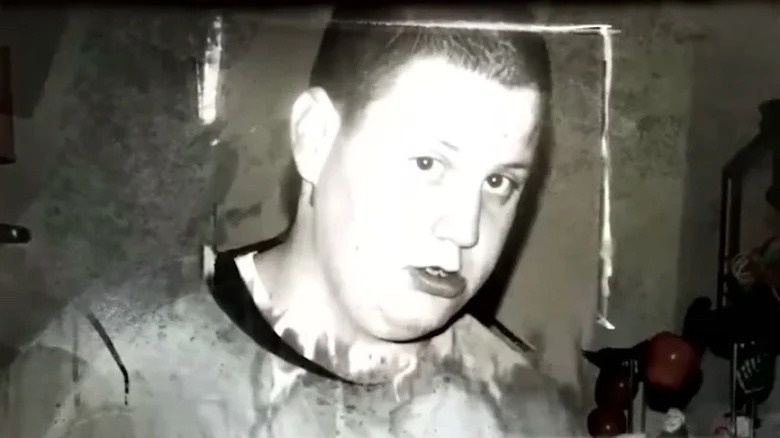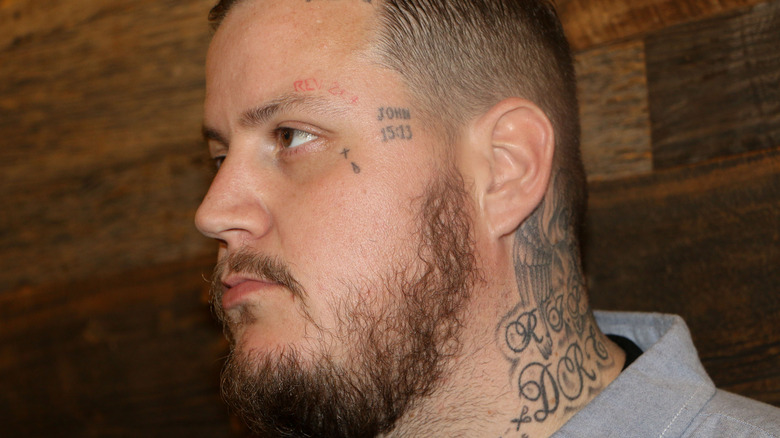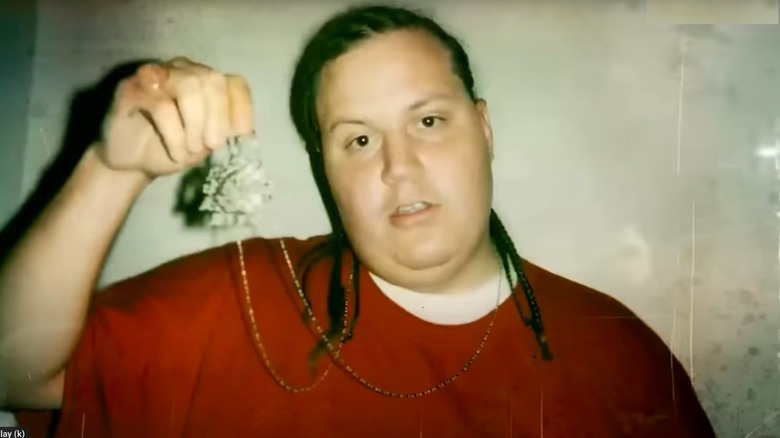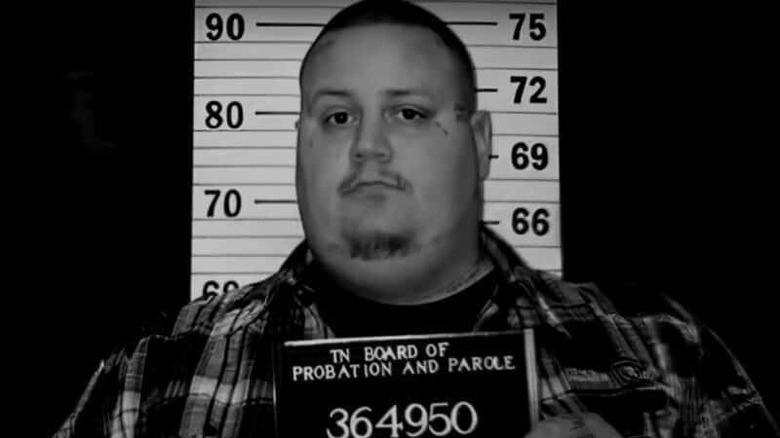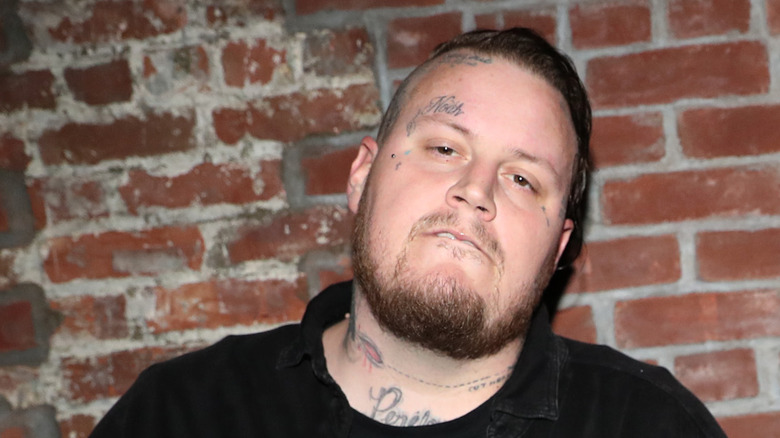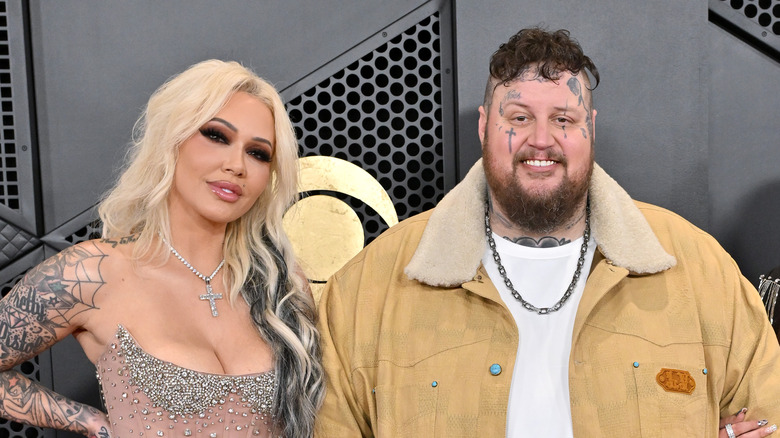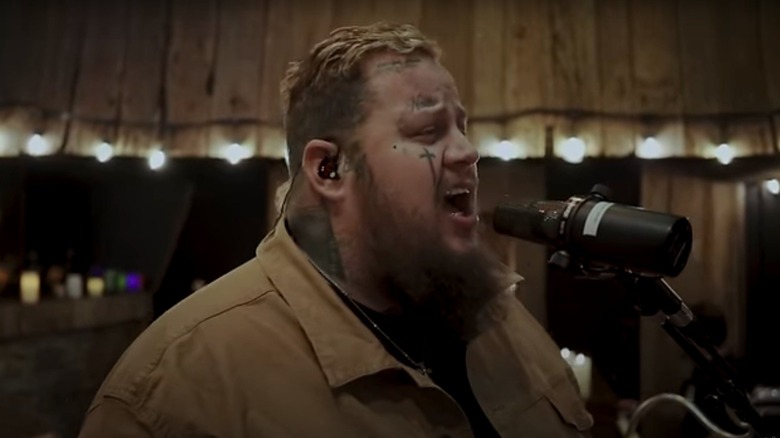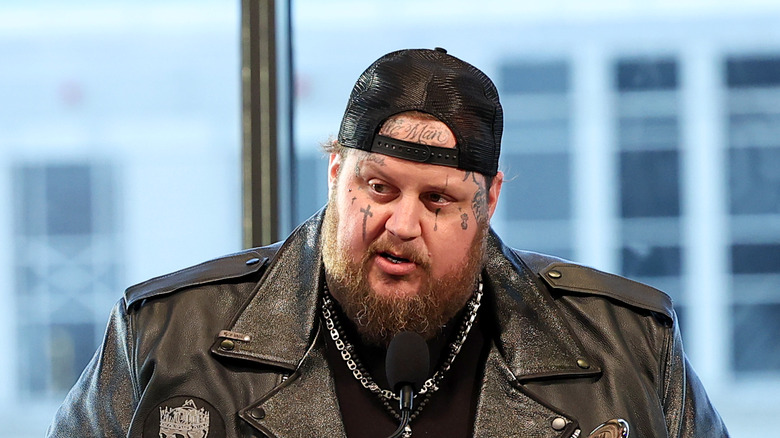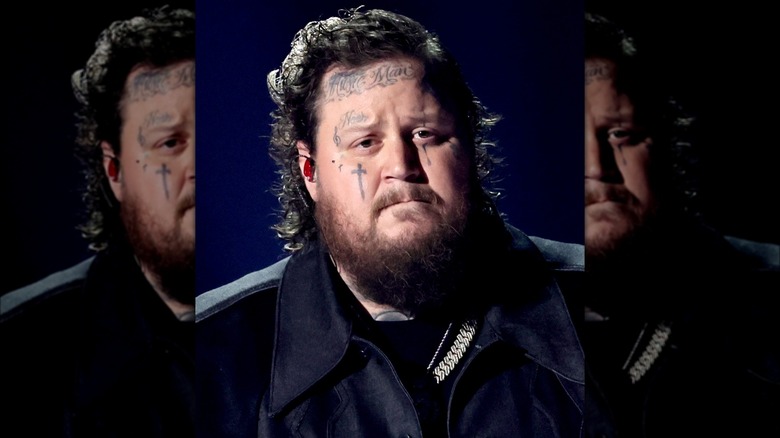The Tragic Real-Life Story Of Jelly Roll
There is no better word to describe the ascension of Jelly Roll than "phenomenal." Bursting onto the country music scene seemingly out of nowhere in 2020, he quickly became a fixture at award shows as his albums and singles skyrocketed up the charts. In fact, there was no surer a sign that he'd arrived than when he made his headlining debut at Nashville's Bridgestone Arena in December 2022 — and sold out the 15,000-seat venue.
That incredible success — and in such a brief span of time — is undeniable, but Jelly Roll is hardly an overnight sensation. In fact, his achievements in showbiz were preceded by more than a decade of punishing work, performing before small audiences and living out of the van that carried him from show to show, his rise to fame resulting from his ability to overcome the kind of seemingly insurmountable obstacles that would leave most people defeated.
At the end of the day, Jelly Roll's story is characterized by his ability to transform tragedy into triumph, all of which is reflected in his own personal growth as he works to change destructive old patterns and forge better ones. "I see myself as a broken man that's trying to put the pieces of the puzzle back together," he explained in a 2023 interview with The Guardian. To find out more about that side of his journey, read on for a look into the tragic real-life story of Jelly Roll.
Jelly Roll's childhood was characterized by poverty and addiction
Jelly Roll was born just outside of Nashville, in Antioch, Tennessee. Entering the world as Jason DeFord, his mother first started calling him Jelly Roll when he was a child, and he's carried that nickname with him ever since. "To this day, my mother calls me Jelly. If somebody walked in here right now and said, 'Jason,' I wouldn't look up," he joked while interviewed for "CBS Sunday Morning."
Looking back at his childhood, Jelly Roll recalled his neighborhood as straddling middle- and lower-class status, and never really thought of his family as impoverished. "I guess we grew up poor, but I didn't feel like it because I never wanted," he said while appearing on the "Flagrant" podcast.
That said, he certainly wasn't exposed to a whole lot of affluence while growing up. "I don't think I knew anybody with a real job," he mused in an interview with GQ, revealing that everyone around him seemed to be involved in some sort of hustle. In addition, most people he knew were doing drugs — and eventually he was too. As he grew older, he graduated from doing drugs to selling them. It wasn't particularly lucrative, but at least it afforded him a bit money. "It was scratching and clawing by, and sadly, scratching and clawing by was better than everybody else," he added. "I don't remember nobody with real money."
His parents' divorce pushed him into a life of crime
Jelly Roll was just 13 when his parents decided they could no longer make their marriage work, and got divorced. Because of his mother's ongoing struggles with mental health issues and substance abuse, he felt that she was his responsibility. He chose to stay with her rather than live with his father, so he'd be able to make sure she was okay. "I told my dad before he died [in 2019], 'I wonder, if I'd have moved in with you when you divorced, if I'd have went to Vanderbilt [University] or something.' But I felt this need to take care of my mother back then," he told Billboard.
That responsibility he felt wasn't just emotional. It also had financial implications. Realizing he needed to bring in some extra cash to support them both, the quickest and easiest path he saw ahead of him was crime. "I think that's what really did it, too," he said, reflecting on how his father's exit from the family pushed him toward theft and drug-dealing. "When he left, I was like, 'Somebody's got to do what he was doing, at least trying to figure out some money,'" he recalled.
Getting arrested in his teens began a yearslong pattern of incarceration
It wasn't long after his parents' divorce that Jelly Roll's criminal activities yielded harsh consequences. He was just 13 when he was arrested for the first time. All told, he would go on to be jailed about 40 times over the next decade or so. Appearing on the "Flagrant" podcast, Jelly Roll recalled that first bust (related to marijuana), which was followed by a second arrest at 14 for robbery. "It was a drug deal gone bad," he said of that robbery charge, which was followed by another when he was 15.
Due to those arrests, he spent large chunks of his teenage years in Nashville's Davidson County Juvenile Detention Center. "I was in and out of there for about three, three and a half years," Jelly Roll told People. "I spent a lot of time there ... that was the most impactful thing that ever happened in my life."
Looking back, Jelly Roll has come to realize that the criminal that his younger self engaged in was almost entirely a result of his environment at the time. "My daddy used to say it this way, like, 'Never be a snake unless you're in a snake pit,'" he said while appearing on the "Flagrant" podcast. "And that's how I felt about the streets."
Jelly Roll was sentenced to hard time when he was just 16
After all those arrests as a minor, Jelly Roll was 16 years old when he was hit with his most serious charge to date, aggravated assault. Despite his juvenile status, prosecutors determined that the circumstances of the crime were severe enough to try him as an adult — which meant a potential sentence of 20 years in prison. "They were talking about giving me more time than I'd been alive," he explained in an interview with Billboard. "I was charged as an adult years before I could buy a beer, lease an apartment, get a pack of cigarettes."
Ultimately, Jelly Roll received a sentence of eight years in a federal penitentiary and was released after serving less than two years. His freedom, however, was short lived, and he continued to return to jail in a recurring pattern that stubbornly refused to change. "I feel like the justice system at that point kind of parked me on my only set path," he mused.
Jelly Roll eventually began to hit a point where being behind bars offered more familiarity than life on the outside. "Jail was like a high school reunion for me," he told The Guardian. "You go in there, it's like, 'Oh, you're still here, what's up dude.' The rotating door of the judicial system, it's rough, man.
Jelly Roll was behind bars when his first child was born
In 2008, 23-year-old Jelly Roll was back in prison, once again a convict. As he told "CBS Sunday Morning," his life changed in an instant when a prison guard banged on the door of his cell. "He said, 'DeFord, you had a kid today.' I said, 'What?' He said, 'Yeah, yeah, you had a child.' And I was like, 'What's her name?' And he said, 'Hell, I don't know,'" he recalled.
Overcome with the weight of impending fatherhood, he vowed to turn things around and halt the pattern of incarceration that had come to characterize the past decade of his life. The first matter of business was getting his GED, given that he'd never graduated high school. He studied and passed on his very first try. He was 25 when he exited prison for the final time. Shortly after this, he met his daughter, Bailee Ann DeFord — the result of a brief relationship prior to his imprisonment — while she celebrated her second birthday.
As Jelly Roll had hoped, his daughter became a huge part of his life, particularly after he was awarded custody of her. Despite all the years that have passed, the importance of the moment he discovered he had a child remains undiminished for him. "Being a father is so important to me," he explained in an interview with People. "The single most impactful event of my entire life was having my daughter. It changed everything."
He's had to overcome addiction
For most of his youth, drugs had been a central facet of Jelly Roll's life — both doing them, and selling them. "I just remember everybody doing drugs," he recalled of his childhood in Antioch while interviewed by GQ. "I was in my 20s before I realized that having a drug addict in your family wasn't normal."
He came to have a somewhat abnormal relationship with alcohol and cocaine, believing for years that it wasn't possible to partake in one without the other. "I had to learn that you could drink alcohol without doing cocaine," he told People. In addition to the responsibility he felt to daughter Bailee Ann DeFord, his own desire for self-preservation also gave him the impetus he needed to quit using hard drugs. "I had to get rid of the lean [a concoction that mixes soda with codeine cough syrup], the pills, the cocaine," he explained in an interview with The Guardian. "I didn't have a choice. It was me or them, and I had to learn to love myself."
His past issues with substance abuse may be in the rearview mirror, but they'll always be a part of him on some level. "I mean, it still haunts me like the ghosts I know," he told People, "but I tell you what, I don't think about doing no drugs today."
His marriage to Bunnie Xo nearly ended
In 2016, Jelly Roll married Bunnie Xo, a sex worker turned social media phenom, in an impromptu ceremony held at a Las Vegas wedding chapel. Despite such an inauspicious start, the couple's unorthodox marriage has been an enduring one, with the couple renewing their vows (in the same Vegas chapel where it started) in 2023.
But it hasn't always been smooth sailing. Such was the case in 2018, when the relationship hit a major obstacle. "I'm sure you guys know by now that Jay and I have separated," Bunnie told viewers on her YouTube vlog, breaking into tears and admitting, "It's been hard." While she didn't detail the ins and outs of what had pushed their marriage to the breaking point, they eventually got back together.
As the years passed, Bunnie transformed into a successful podcaster and eventually revealed that their separation and subsequent reconciliation made their marriage even stronger than it had been. "Who knew that us breaking up in 2018, me moving back to Vegas & you coming to get me back — would have put us on this wild journey called life," she wrote in the caption for a 2024 TIkTok video. "We finally committed to each other & did everything we promised each other the first night in 2016," she added. "Our castle in the sand had to crumble so we could rebuild on solid ground."
Jelly Roll has struggled with mental illness
While growing up, Jelly Roll watched helplessly as his mother battled with some serious issues. "My mother was a woman who dealt with mental health and drug addiction," he divulged while appearing on the "Flagrant" podcast.
As he later revealed, he's also grappled with issues involving his own mental health. "The truth is I struggle with severe depression — I've struggled with it my whole life," he wrote in a candid message he shared on Instagram. "I have moments of extreme productivity where I feel like nothing can stop me. I'm full of energy and confidence, then I have weeks on end where I won't answer my phone or respond to a text message," he explained, revealing that he'd been diagnosed with "manic depression."
He shared the revelation, he explained, in the hope that others going through similar experiences would read his words and feel encouraged to know that they're not alone. "I've always been afraid to make this post because frankly I'm slightly embarrassed and sadly we live in a world where when people bring up mental health issues we are immediately judged one way or the other," he continued. "I also felt like those that listen to the music know how deep my sadness runs in my soul and my struggles."
His breakthrough hit was born from darkness
As Jelly Roll indicated in that Instagram post detailing his struggles with mental health, his music is permeated with pain and sadness. That was absolutely the case with his signature song, "Save Me," the track that catapulted him into the public consciousness. It was also deeply personal. "It was like a therapy session publicly," Jelly Roll explained while appearing on "Theo Von Clips." "The biggest thing for me was just letting those emotions out, in a public way."
While the subject matter of much of Jelly Roll's music is inspired from dark periods in his own past, he's always leapt at the opportunity to transform that darkness into something that will offer some hope to others. "God gave me a platform to be useful and of service to people," he told The Guardian.
He's come to understand that's why fans connect with him on such a personal level — and why he's somewhat unique within the music industry. "It's sad to say this, but there's just not a lot of people that write the kind of songs I'm willing to write and talk about the topics I'm willing to talk about, but yet they're so common," he said.
Jelly Roll's mental illness has been reflected in his issues with weight
When Jelly Roll opened up about his issues with mental illness, he also revealed that those issues had impacted his weight throughout his life. "This also explains the constant weight gain, and occasionally I crash diet and lose a lot of weight just to regain it again," he wrote in that Instagram post.
He shared more details about the relationship between his weight and his mental health in a 2018 Instagram post, in which he revealed that he tipped the scales at 500 pounds back in 2015 — although he wasn't able to discern his actual weight because the scale in his doctor's office didn't go beyond 500. "It was the one of the most embarrassing days of my life, and the bottom line I had done it to myself," he wrote. "I continued to spiral out of control and dealt with the news by more food, more drugs and more liquor."
By 2016, he fought to take control, managing his eating and drinking until he had shed 200 pounds. Over time, however, his bad habits resurfaced, and he was chagrined to discover he'd regained 60 of the pounds that he'd lost. "I've been obese since I was a small child," he wrote. "All I've ever known was being fat, and I'm f***ing miserable ... I want to LIVE a normal life and have a normal relationship with food."
He's lost many friends to addiction
There's a simple reason why Jelly Roll's music connects so viscerally with listeners: He's lived what he sings about. That's particularly true when it comes to songs such as "She," which details a woman's struggles with substance abuse (and was, he's revealed, based on his mother). "I've had so much addiction around me," Jelly Roll recalled during an interview with Taste of Country. "And so many people around me lose their lives, or lose their families, or lose somebody they loved, over an addiction."
He drew from those experiences when he appeared before the U.S. Senate's Banking, Housing, and Urban Affairs Committee in January 2024. While speaking before the senators in attendance, Jelly Roll used his platform as a celebrity to shine the spotlight on the fentanyl epidemic in the hopes that the politicians would pass anti-fentanyl legislation.
"I've attended more funerals than I care to share with y'all," he told the committee (via CBS News). "I could sit here and cry for days about the caskets I've carried of people I love dearly, deeply, in my soul. Good people." He also acknowledged his own role as a former drug dealer who had once contributed to the very crisis he was now trying to combat. "I was a part of the problem," he declared. "I brought my community down. I hurt people. I was the uneducated man in the kitchen playing chemist with drugs I knew absolutely nothing about."
Jelly Roll's phenomenal success has led him to experience survivor's guilt and imposter syndrome
Having seen firsthand the devastating impact that addiction has had on so many people close to him, Jelly Roll has transcended his own origin story, changing the narrative so that he's not only survived but thrived. He's come to realize how lucky he is to be in that position, yet he has also experienced no small degree of survivor's guilt over it.
"I have a phone full of the sob stories; guys I knew from the past," he told The Guardian, revealing the frequency with which people with whom he was once close reach out to him for some kind of financial assistance. "And they want two grand, five grand, a car, a house," he explained. "So you read them. And it just hurts." Clearly, he's not able to help out everyone who comes to him, hat in hand, which only works to exacerbate the survivor's guilt he's already experiencing. "The guilt you feel creates a spiral of shame," he explained. "But it also hurts to separate yourself from these people."
Meanwhile, the success he's experienced has led him to question his own self-worth and whether he's deserving of the good fortune that he's now enjoying. "I struggle with imposter syndrome a lot," he said in the Hulu documentary, "Jelly Roll: Save Me" (via ABC News).

